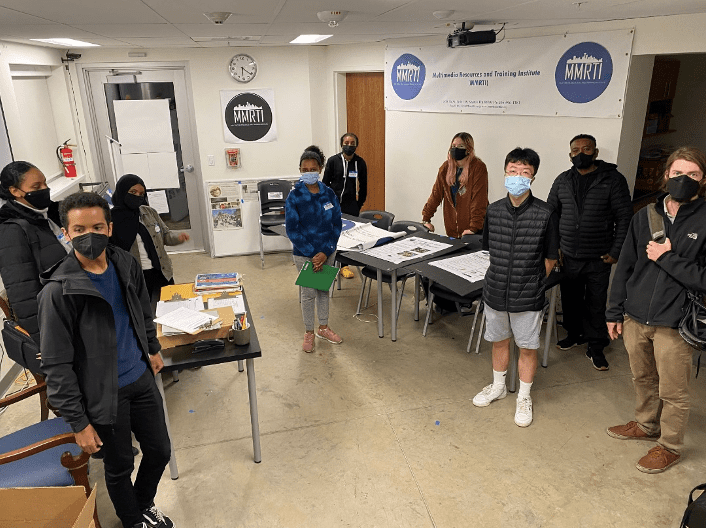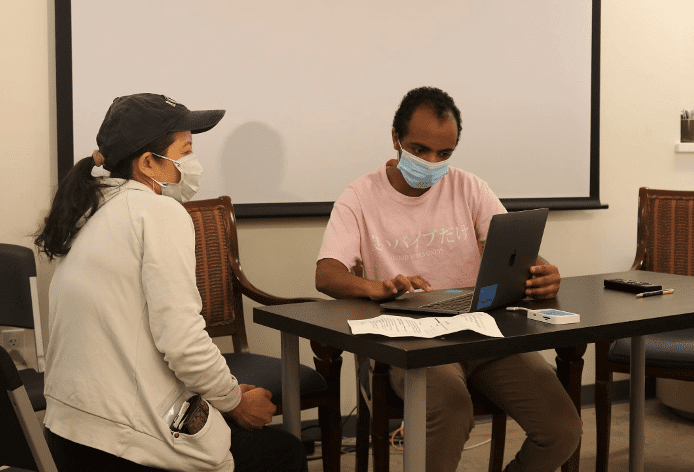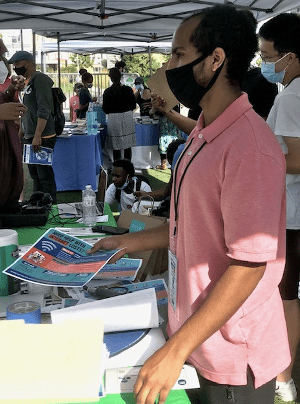

Photo by Assaye Abunie.
In response to the COVID-19 pandemic in 2020, the Multimedia Resources and Training Institute (MMRTI) created a Family Digital Navigators Program that hired and trained local students to help the Yesler community progress towards digital equity. The MMRTI Navigators work closely with Yesler residents to help them better learn and be able to participate in the evolving digital world. This work helps families with limited or no access to the internet, who lack the experience to do activities such as e-learning, homework, depositing a check, looking for jobs, applying for benefits, and other critical activities online.
Assaye Abunie, executive director and founder of MMRTI, says that the MMRTI Navigators offer support so people can “learn, connect, and process the digital world the way that it is now.” This doesn’t necessarily mean they are providing the community with internet access themselves, but rather supporting them through the process of getting that service through resources provided by partnerships.
Partnership resources come in the form of internet access, digital skills, technological support, devices, applications, and services provided in a culturally appropriate manner. While the pandemic has made it hard to reach out to the community, this team of Navigators finds alternative methods of communication (going door-to-door, sending fliers, calling, etc.) to promote an equitable learning environment that makes technology more accessible and inclusive to the Yesler community.
Support for the program
This Family Digital Navigators program is funded by the Seattle Housing Authority (SHA) and the City of Seattle’s Technology Matching Fund program to provide digital equity services to the Yesler community. Community builders from the SHA work closely with the MMRTI Navigators to find common themes between the residents’ issues and provide them with any resources necessary. SHA found that about 15% of Seattle households don’t have access to any kind of internet access and as much as 65% of SHA residents lack access.
Both SHA and MMRTI found that Yesler residents needed more than what the team could offer. As a result, the team partnered with Comcast and the Seattle Public Library. Comcast has been working with the MMRTI Navigators team to provide in-person technical support at MMRTI to answer any questions. Comcast also supported the team with five laptop computers to raffle at a festival called “Yes Fest” which promoted the program and encouraged the community to consider registering for free internet access. A Seattle Public Library partnership has helped the team provide Digital Literacy training for the community through classes.
Accomplishments so far

Although the MMRTI faced some challenges due to the pandemic limiting their outreach and engagement, the team managed to reduce and eliminate cultural, institutional, and structural barriers to access and use technology with the support from the previous organizations mentioned. Their abilities to also communicate with a diverse community has also “been successful, helpful, and effective” to inform and educate residents about what they can provide, says Assaye.

Photo by David Keyes
The team registered 140 residents for technical support and helped 52 residents sign up for low-income internet programs this past year and are continuing to help residents enroll in the Affordable Connectivity Program, or ACP (formerly the Emergency Broadband Benefit). The ACP is a federal subsidy to help households struggling to afford internet service. This effort by the MMRTI Navigators complements the new digital literacy training programs that the team is currently holding. The team continues holding digital literacy classes, workshops, computer lab hours, and technical support of residents who may have questions.
SHA is expanding the Digital Navigators program and serving more than 5,000 residents in the Seattle area with digital navigation, thanks to a $1.8 million grant from the Washington State Department of Commerce Broadband Office. SHA has now hired digital navigators and begun distributing more than 2,000 laptops and other devices to residents. The digital navigators are helping residents learn to use their devices, training them to connect to the internet, get setup with emails and go online effectively to participate in the digital world.
Overcoming barriers
The digital navigator program is designed to address the diverse languages and cultures within the Yesler community. Of the 140 residents that the team has served, 130 (92%) of them were limited English speaking. Many of the MMRTI Navigators were hired from the area and have been of great support as they speak their community’s languages (Oromo, Amharic, Tigrinya, and Arabic). Some navigators speak up to six different languages, and they act as translators for residents who face language barriers in using online services and signing up for services like the Affordable Connectivity Program internet subsidy.
Community and cultural roots have helped the team of navigators become trusted ambassadors for the Yesler residents. Promoting the program through phone calls, video clips, and fliers in different languages have been essential to reaching the extensive range of residents in the community. These efforts have also allowed them to reach out through event activities such as Yes Fest, which gave them a big opportunity to inform and engage residents about their digital equity service.
The MMRTI Navigators’ work is guiding the Yesler community towards digital equity. These navigators are essential to connecting residents to the progressing world of technology. Furthermore, the program has provided job training, employment, and experience for the navigators themselves. “Anyone who has a technological background, has the knowledge to educate others, and has a technological skillset can be one to teach others” can become a digital navigator, says Assaye. Their work wouldn’t have been possible without the support from organizations and partnerships that have helped them continue to pave the way for those struggling with access to the digital world.
MMRTI is working to scale the program to build their digital navigator corps and train new navigators. They are helping with the larger rollout of digital navigator service to Seattle Housing Authority residents, expand their services at Yesler and help with other sites. MMRTI’s Family Digital Navigator Program is a model for how community and multiple partners can come together to help us move forward in our collective Seattle Internet for All effort.
For more information about MMRTI, visit their website here.